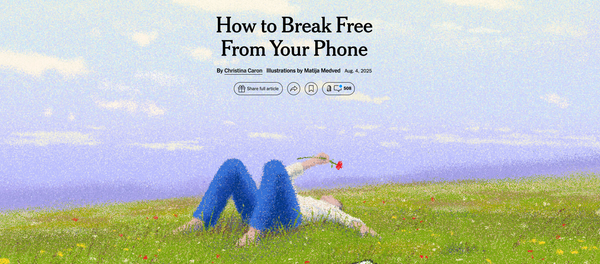'Nones' the Word: More data about religious disaffiliation
And a couple points about why we should care

This is the week in Adapting Christian Formation when we zero in on the importance of context. And all things being equal, I think the most ubiquitous contextual reality for ministry leaders in the U.S. context is the changing nature of religious affiliation.
We looked on Monday at the Nones' growth rates via the longitudinal data from Gallop. Today I want to look at some data from Pew and two important points from the thoughtful, generous None interpreter Elizabeth Drescher.
First, the biggest caveat, which is the point I start with in class: Drescher makes a really important methodological observation in Choosing Our Religion, her 2016 book about the spiritual lives of Nones:
The tremendous diversity of self-identification of American Nones is among the most difficult things for commentators—academic, journalistic, and religious alike—to grasp about a demographic category that does not, in fact, describe a distinct social group. ‘None’ is a ‘negative definition.’ It describes people who do not identify as belonging to a specific group. (p. 5)
We might reasonably expect to see some coherent cultural similarities in "positive" groups, people who all say "yes" to something and are therefore likelier to have some traits in common by virtue of their group membership. Not so for the Nones.
So the first point is that, while we should always be cautious about treating groups as monoliths, that is especially true for Nones.
One thing I like I about Pew's January 2024 report "Religious ‘Nones’ in America: Who They Are and What They Believe" is that they often break the data down in ways that help us address this sociological conundrum. You'll see answers to a couple of the questions in this report broken down into the three None subgroups:
- Atheists – about 1 in 6 Nones
- Agnostics – about 1 in 5 Nones
- People who answer "Nothing in particular" – about 2 in 3 Nones
Sometimes this distinction matters a fair bit. For example, the "Nothing in particular" group is a little less likely to be civically and socially engaged than the other Nones, at least by some measures. Still, Pew's takeaway here is that "differences between ‘nones’ and the religiously affiliated are often modest."
That's part of Drescher calls us religiously affiliated folks Somes. 😊
**
OK, with this caveat firmly established, there are some data points I find especially important as someone who enjoys being in conversation with Nones:
- 55% of all Nones believe religion does equal amount of good and harm or more good than harm
- 58% of all Nones believe religion "helps society by giving people meaning and purpose in their lives"
☝️ I think there's a conception that Nones are uniformly hostile to religion, but it's more likely that they're mixed (and, in my frequent experience, curious). For those of us who grew up before the None explosion, I think this is an important mindset shift.
- 69% of all Nones believe in some kind of higher power
- 64% of Nones who also report being spiritual say "Being connected with something bigger than myself" is essential
- 70% of Nones who also report being spiritual say "Being open-minded" is essential
☝️ Here again, if you grew up in a time when a larger percentage of Nones were atheists, this is perhaps not the portrait of your None conversation partners you probably formed. I've had some very enjoyable and moving conversations in bars with folks whose spiritual orientation is captured by these data points.
- 40% of Nones who also report being spiritual say "Being connected with other people" is essential
☝️ If you're like me, you might find this data point a little depressing. You know what's more depressing? Only 39% of religiously affiliated spiritual people said it was essential. Yikes.
I continue to believe that we should be more concerned about our country's crisis of community than the changing state of religious affiliation—and that community-minded adaptations are essential for people of faith who want to respond thoughtfully to contemporary trends.
**
OK, aside from actually enjoying the "occupational hazard" of talking about faith with people in bars, why does all this matter?
Not, I hope, because it gives religious people ideas for angles to try to convince anyone of anything. If that's what you're looking for, you're reading the wrong newsletter.
Some of the most compelling testimonials in Choosing Our Religion are from Nones who nevertheless participate in the life of congregations: singing in choirs, serving in food pantries, etc.
For me, all this data matters because (1) it can shape—and often challenge—religious' people's understanding of Nones. Which is important because (2) Nones are everywhere, including in our congregations and almost certainly in loving relationship with people in our congregations.
Of all my heartbreaking moments as a member and eventually a leader of religious communities, the ones that gut me the most are when people who are drawn to faith communities for some reason—and they're not even always sure of what that reason is—come to believe that they are not welcome. That they shouldn't stick around if they're not full of faith. That they shouldn't stick around if they mostly come for the music, or the company, or the food.
My friend Jim Naughton often writes that clergy frequently "tell on themselves" by the way they talk about lay people when they don't realize there are some in the room.
I think the same is true for how religiously affiliated people talk about religiously unaffiliated people. Nones are not the enemy of religious people. They're not a problem to be solved.
I don't give Nones so much real estate in my course because I want there to be fewer of them in a decade.
I want Somes to keep building community and ministry models that (at minimum) don't demonize Nones, and that (at their best) give Somes and Nones more chances to love and serve the common good together.



